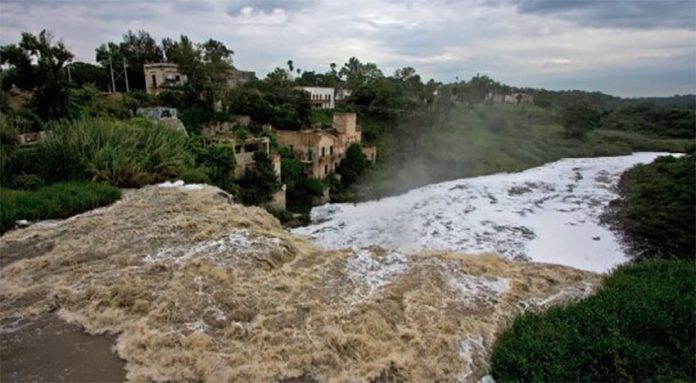Jalisco’s heavily contaminated Santiago River is “a powerful example of Mexico’s failure to protect its environment,” according to a report by The New York Times.
Published on Monday, the report said that an analysis of 15 years of efforts to clean up the river found that little progress was made due to “legal loopholes, deficient funding and a lack of political will.”
The Times also said that Mexico will likely be unable to meet the commitment it made to protect its environment as part of the new North American free trade agreement without an overhaul of its “flawed legal framework and a change in the political conditions that allowed the Santiago to become little more than a channel for industrial runoff.”
Farms and factories in the Santiago River basin dump illegal quantities of waste into the river with little penalty, the report said.
River pollution, which includes contamination from several heavy metals, has been blamed for a range of illnesses among people who live near the river including kidney disease and cancer. An eight-year-old boy died from arsenic poisoning in 2008 after falling into a tributary of the Santiago.
Yet there is scant oversight of some 10,000 businesses operating in the area because the National Water Commission (Conagua) has just one inspector in all of Jalisco, the Times said.
Conagua chief Blanca Jiménez said recently that some companies treat their wastewater but conceded that some don’t, “even when they have the economic means.”
In those cases, she added, “the state has to intervene.” However, it rarely does, the Times said.
The report noted that even when Conagua does respond to cases of illegal runoff into the Santiago River, the fines it has the power to impose are too low to act as a deterrent.
Texas-based chemicals company Celanese Corporation was fined just US $4,300 for discharging illegal quantities of waste into the river on 13 separate occasions in the summer of 2015 , according to documents obtained by the Times.
The report also said that the federal environmental protection agency, Profepa, has the power to inspect industrial wastewater, “but rarely does so.”
In December 2018, Jalisco Governor Enrique Alfaro told reporters gathered at the Santiago River’s contaminated Juanacatlán waterfall that his newly-elected government would invest more than 3.4 billion pesos to tackle the pollution problem.
But the Times said the pledge was a “bold” one given that his power and resources to address the issue are in fact limited.
When Alfaro asked the federal government for funding, he was told that there was no money available even though the federal environment secretary has called the Santiago River an “environmental hell.”
Elizabeth Southerland, a former water expert at Profepa, told the Times that the limited rules in place to protect the river are “totally inadequate to protect aquatic life and human health.”
In turn, the agencies tasked with enforcing them have “few resources and little political support,” the Times said, “making them no match for the country’s expanding industry and growing population.”
In theory, municipal authorities also have power to crack down on polluters but with scant resources and technical expertise they are in fact the weakest link in enforcing regulations, the report said.
The situation does not bode well for residents, one of whom described El Salto, a town on the outskirts of Guadalajara, as a “slow-motion Chernobyl.”
“The government is walking hand in hand with the guilty,” said Enrique Enciso, whose family has been fighting to clean up the Santiago River for more than 10 years.
Source: The New York Times (en)
